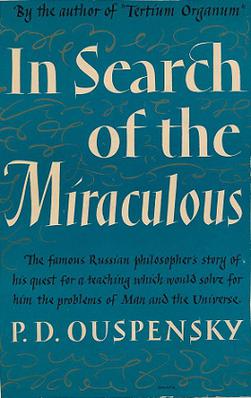In Search of the Miraculous
In Search of the Miraculous is a seminal work in the realm of esotericism and spirituality, written by P. D. Ouspensky. It details Ouspensky's encounters and subsequent apprenticeship with the Greek-Armenian spiritual teacher G. I. Gurdjieff. This book is often cited as a critical introduction to Gurdjieff's teachings and the broader system of work known as the Fourth Way.
Overview[edit | edit source]
In Search of the Miraculous delves into the complex and often misunderstood teachings of Gurdjieff, which are based on the idea that most humans live their lives in a state of hypnotic "waking sleep," but that it is possible to awaken to a higher state of consciousness and achieve full human potential. Ouspensky meticulously documents the concepts, methods, and exercises taught by Gurdjieff, which include meditation, self-observation, and sacred dances or movements.
The book is divided into two main parts. The first part details Ouspensky's search for a teaching that could answer his existential questions and his eventual meeting with Gurdjieff. The second part provides a comprehensive overview of Gurdjieff's teachings as taught to Ouspensky and other students. These teachings emphasize the necessity of self-awareness, self-discipline, and the potential for self-transformation.
Themes and Concepts[edit | edit source]
Several key themes and concepts are explored in In Search of the Miraculous, including:
- **The Fourth Way:** Unlike the traditional three ways of the fakir, monk, and yogi, which demand a significant renunciation of physical, emotional, or intellectual life, the Fourth Way is a path that can be followed in the midst of ordinary life. It does not require one to retreat from the world but rather to engage with it more consciously.
- **Levels of Consciousness:** Gurdjieff's teachings as presented by Ouspensky introduce the idea of different levels of consciousness, from the lowest level of sleep to the highest level of full awakening or enlightenment.
- **Law of Three and Law of Seven:** These are fundamental laws described in the book that govern everything in the universe. The Law of Three states that every phenomenon is the result of three forces—affirming, denying, and reconciling. The Law of Seven, or the Octave, explains the process of evolution and involution in a series of stages, each governed by specific laws.
- **Self-Remembering:** A core practice in Gurdjieff's teaching, self-remembering involves a constant awareness of oneself and one's state of being, leading to a more conscious and intentional way of living.
Impact and Legacy[edit | edit source]
In Search of the Miraculous has had a profound impact on the study of esoteric traditions and spiritual development. It has introduced many to the teachings of Gurdjieff and the Fourth Way, inspiring seekers and practitioners around the world. The book remains a foundational text for those interested in Gurdjieff's ideas and the potential for achieving a higher state of consciousness.
See Also[edit | edit source]
Search WikiMD
Ad.Tired of being Overweight? Try W8MD's physician weight loss program.
Semaglutide (Ozempic / Wegovy and Tirzepatide (Mounjaro / Zepbound) available.
Advertise on WikiMD
|
WikiMD's Wellness Encyclopedia |
| Let Food Be Thy Medicine Medicine Thy Food - Hippocrates |
Translate this page: - East Asian
中文,
日本,
한국어,
South Asian
हिन्दी,
தமிழ்,
తెలుగు,
Urdu,
ಕನ್ನಡ,
Southeast Asian
Indonesian,
Vietnamese,
Thai,
မြန်မာဘာသာ,
বাংলা
European
español,
Deutsch,
français,
Greek,
português do Brasil,
polski,
română,
русский,
Nederlands,
norsk,
svenska,
suomi,
Italian
Middle Eastern & African
عربى,
Turkish,
Persian,
Hebrew,
Afrikaans,
isiZulu,
Kiswahili,
Other
Bulgarian,
Hungarian,
Czech,
Swedish,
മലയാളം,
मराठी,
ਪੰਜਾਬੀ,
ગુજરાતી,
Portuguese,
Ukrainian
Medical Disclaimer: WikiMD is not a substitute for professional medical advice. The information on WikiMD is provided as an information resource only, may be incorrect, outdated or misleading, and is not to be used or relied on for any diagnostic or treatment purposes. Please consult your health care provider before making any healthcare decisions or for guidance about a specific medical condition. WikiMD expressly disclaims responsibility, and shall have no liability, for any damages, loss, injury, or liability whatsoever suffered as a result of your reliance on the information contained in this site. By visiting this site you agree to the foregoing terms and conditions, which may from time to time be changed or supplemented by WikiMD. If you do not agree to the foregoing terms and conditions, you should not enter or use this site. See full disclaimer.
Credits:Most images are courtesy of Wikimedia commons, and templates Wikipedia, licensed under CC BY SA or similar.
Contributors: Prab R. Tumpati, MD

